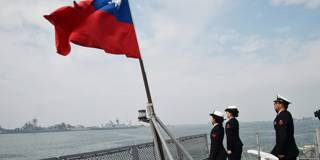The goal of US policy toward the island should be to reduce uncertainty about America’s intentions and its ability to make good on them, while underscoring to Chinese leaders the economic and military costs of aggression. As much as China’s leaders want Taiwan, they also want to maintain power and the Communist Party’s political monopoly.
NEW YORK – The relationship between the United States and China promises to do much to define this era. And what could determine this relationship might well be whether the two countries are able to continue to avoid armed conflict over Taiwan. But with signs that the chances of conflict are growing, the question facing the US and its partners is how to avoid that outcome without sacrificing essential interests.
Conceptual framing is always critical to foreign policy. This is no exception. There are problems and there are situations. Problems can in principle be solved. Situations can at best be managed. Taiwan is a situation. Attempts to treat it as a solvable problem will not just fail, but most likely result in a conflict that will leave the US, Taiwan, China, and others in the region and the world much worse off. The reason is that there is no possible outcome that would be universally acceptable.
The good news is that the diplomatic framework that the US and China put in place four decades ago, in which the two sides essentially agreed to disagree over Taiwan, allowed them to avoid conflict and build a productive relationship that helped end the Cold War peacefully and on Western terms. The US and China went on to develop a deep economic relationship. Taiwan, for its part, became one of Asia’s tigers and evolved from a one-party dictatorship into a robust democracy.

NEW YORK – The relationship between the United States and China promises to do much to define this era. And what could determine this relationship might well be whether the two countries are able to continue to avoid armed conflict over Taiwan. But with signs that the chances of conflict are growing, the question facing the US and its partners is how to avoid that outcome without sacrificing essential interests.
Conceptual framing is always critical to foreign policy. This is no exception. There are problems and there are situations. Problems can in principle be solved. Situations can at best be managed. Taiwan is a situation. Attempts to treat it as a solvable problem will not just fail, but most likely result in a conflict that will leave the US, Taiwan, China, and others in the region and the world much worse off. The reason is that there is no possible outcome that would be universally acceptable.
The good news is that the diplomatic framework that the US and China put in place four decades ago, in which the two sides essentially agreed to disagree over Taiwan, allowed them to avoid conflict and build a productive relationship that helped end the Cold War peacefully and on Western terms. The US and China went on to develop a deep economic relationship. Taiwan, for its part, became one of Asia’s tigers and evolved from a one-party dictatorship into a robust democracy.